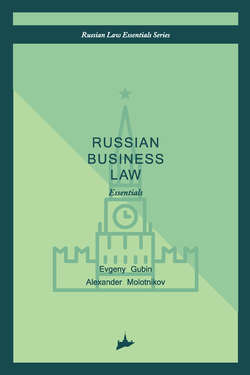Читать книгу Russian business law: the essentials - - Страница 7
Alexander Molotnikov,[3] Levon Garslian,[4] Andrei Gabov[5]
Introduction to Business Law in Russia
1. Entrepreneurship Revival
ОглавлениеFor almost 70 years[6] during the existence of the USSR, entrepreneurship was impossible and even illegal. The key feature of the economy in the Soviet period was the "leading role" of the Communist Party. The Soviet economic system had to comply with the principles that the Party proclaimed: one-party leadership, planned economy, state ownership, and high rates of accumulation. To uphold these principals, the use of non-economic coercion could be possible. Thus, the Soviet economy itself was like one large corporation owned by the state and managed by the Communist Party. Only after the fall of the Soviet Union in late 1991 and the transition to the free market economy, one could start thinking about doing business.
The first legal developments towards the revival of entrepreneurship in the Soviet Union took place even earlier, and are related to the passing of such laws of the USSR as "On individual labor activity" (1986), "On cooperation in the USSR" (1988), and "On general fundamentals of citizen entrepreneurship in the USSR" (1991). Entrepreneurship received the most developed legal regulation in legislation of the Russian Federation – in laws of the RSFSR "On companies and enterprise" (1990), "On registration fee for natural persons carrying out entrepreneurship and a procedure of their registration" (1991), “On property in the RSFSR” (1990), the Constitution of 1993, and the Civil Code of the RF.
For a revival of entrepreneurship in the Russian Federation, one had to create corresponding economic-legal prerequisites. They were created stage-by-stage via reformation of the economic system at the legislative level. The core change related to the transformation of property ownership. In conditions of a socialist property domination, where state ownership constituted the basis of the economic system of the USSR. With this form of socialist property,[7] the revival and development of entrepreneurship was simply impossible, due to a lack of proprietary forms’ variety, lack of private property, a lack of a market and its participants, and competition.
A new approach to a system of forms of ownership that developed in our country was expressed by passing the law of the USSR of March 6, 1990, "On property in the USSR," and by passing respective version of the Constitution of the USSR. The law of the USSR "On property in the USSR," (article 2.1.) for the first time directly permitted all the owners and so, even citizens to use property belonging to them for any economical or other activity not prohibited by a law. Furthermore, in combination with the right to use the labor of other citizens during exercise of property rights (article 1, paragraph 4), this law essentially opened a way to a revival of entrepreneurship.
Therefore, the adoption of the law of the USSR, "On General Fundamentals of Citizen Entrepreneurship in the USSR," seems very appropriate. Enterprises, buildings, equipment, and other means of production, and any other property have become the objects of the private property.
In the Russian Federation, the Law of the RSFSR of December 24, 1990, "On Property in the RSFSR" in art. 2, paragraph 3, the right of private, state, municipal ownership, as well as of ownership of public associations (organizations) were enshrined. This was the fundamental law which regulated ownership in this period.
The Constitution of 1993 RF recognized and protected in an equal way private, state, municipal and other forms of ownership (part 2 of art. 8); in the Russian Federation, “land and other natural resources can be in a private, state, municipal and other forms of ownership” (part 2 of art. 9).
This provision has been developed in the Civil Code RF, article 18, which is devoted to the legal capacity of citizens, granting them the right "to own the property… to carry out business and other activities not prohibited by laws; create legal entities on their own or together with other citizens and legal entities; conduct any transactions not prohibited by laws." Hence, the Civil Code of the RF includes the key condition of entrepreneurship – the right to carry out business activity. Freedom of labor is another indispensable condition of entrepreneurship, granted by the Constitution of the RF (art. 37).
Thus, by the beginning of the 1990s, the following fundamental conditions, necessary for the existence and development of entrepreneurship, were provided: (1) variety of proprietary ownership (first of all, private property); (2) right to carry out business activity; and (3) freedom of labor.
6
From 1921 to 1991.
7
Article 10, 11 of the USSR Constitution of 1977.
